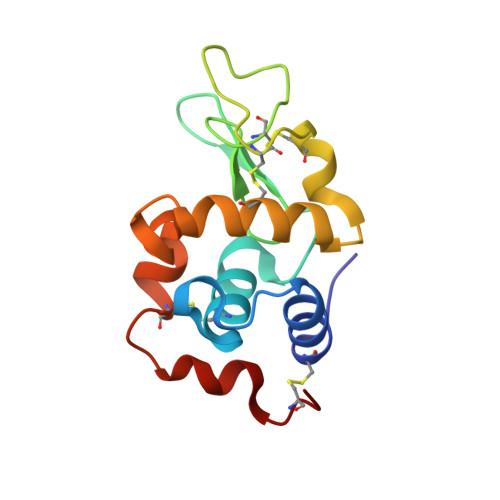Investigating the Impact of Polymer Functional Groups on the Stability and Activity of Lysozyme-Polymer Conjugates.
Lucius, M., Falatach, R., McGlone, C., Makaroff, K., Danielson, A., Williams, C., Nix, J.C., Konkolewicz, D., Page, R.C., Berberich, J.A.(2016) Biomacromolecules 17: 1123-1134
- PubMed: 26866284
- DOI: https://doi.org/10.1021/acs.biomac.5b01743
- Primary Citation of Related Structures:
5F14, 5F16 - PubMed Abstract:
Polymers are often conjugated to proteins to improve stability; however, the impact of polymer chain length and functional groups on protein structure and function is not well understood. Here we use RAFT polymerization to grow polymers of different lengths and functionality from a short acrylamide oligomer with a RAFT end group conjugated to lysozyme. We show by X-ray crystallography that enzyme structure is minimally impacted by modification with the RAFT end group. Significant activity toward the negatively charged Micrococcus lysodeicticus cell wall was maintained when lysozyme was modified with cationic polymers. Thermal and chemical stability of the conjugates was characterized using differential scanning fluorimetry and tryptophan fluorescence. All conjugates had a lower melting temperature; however, conjugates containing ionic or substrate mimicking polymers were more resistant to denaturation by guanidine hydrochloride. Our results demonstrate that tailoring polymer functionality can improve conjugate activity and minimize enzymatic inactivation by denaturants.
- Molecular Biology Consortium, Beamline 4.2.2, Advanced Light Source, Lawrence Berkeley National Laboratory , Berkeley, California 94720, United States.
Organizational Affiliation:


















